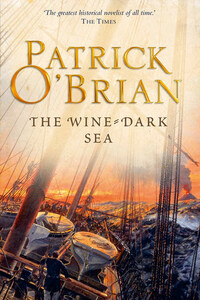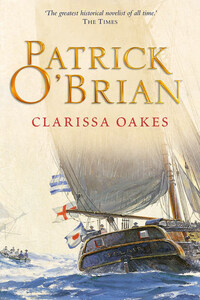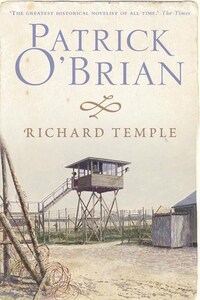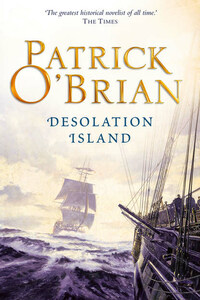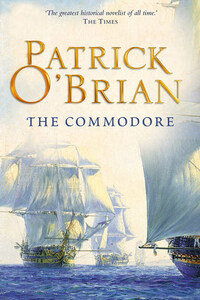PATRICK OâBRIAN
The Wine-Dark Sea
Copyright
This novel is entirely a work of fiction. The names, characters and incidents portrayed in it are the work of the author's imagination. Any resemblance to actual persons, living or dead, events or localities is entirely coincidental.
HarperCollinsPublishers Ltd. 1 London Bridge Street London SE1 9GF
www.harpercollins.co.uk
Copyright © Patrick OâBrian 1993
Patrick OâBrian asserts the moral right to be identified as the author of this work
A catalogue record for this book is available from the British Library
All rights reserved under International and Pan-American Copyright Conventions. By payment of the required fees, you have been granted the non-exclusive, non-transferable right to access and read the text of this ebook on-screen. No part of this text may be reproduced, transmitted, down-loaded, decompiled, reverse engineered, or stored in or introduced into any information storage and retrieval system, in any form or by any means, whether electronic or mechanical, now known or hereinafter invented, without the express written permission of HarperCollins ebooks
HarperCollinsPublishers has made every reasonable effort to ensure that any picture content and written content in this ebook has been included or removed in accordance with the contractual and technological constraints in operation at the time of publication
Source ISBN: 9780006499312
Ebook Edition © DECEMBER 2011 ISBN: 9780007429424 Version: 2017-10-26
The sails of a square-rigged ship, hung out to dry in a calm.
1 Flying jib
2 Jib
3 Fore topmast staysail
4 Fore staysail
5 Foresail, or course
6 Fore topsail
7 Fore topgallant
8 Mainstaysail
9 Main topmast staysail
10 Middle staysail
11 Main topgallant staysail
12 Mainsail, or course
13 Maintopsail
14 Main topgallant
15 Mizzen staysail
16 Mizzen topmast staysail
17 Mizzen topgallant staysail
18 Mizzen sail
19 Spanker
20 Mizzen topsail
21 Mizzen topgallant
Illustration source: Serres, Liber Nauticus. Courtesy of The Science and Technology Research Center, The New York Public Library, Astor, Lenox, and Tilden Foundation
Chapter One
A purple ocean, vast under the sky and devoid of all visible life apart from two minute ships racing across its immensity. They were as close-hauled to the somewhat irregular northeast trades as ever they could be, with every sail they could safely carry and even more, their bowlines twanging taut: they had been running like this day after day, sometimes so far apart that each saw only the otherâs topsails above the horizon, sometimes within gunshot; and when this was the case they fired at one another with their chasers.
The foremost ship was the Franklin, an American privateer of twenty-two guns, nine-pounders, and her pursuer was the Surprise, a twenty-eight-gun frigate formerly belonging to the Royal Navy but now acting as a privateer too, manned by privateersmen and volunteers: she was nominally commanded by a half-pay officer named Thomas Pullings but in fact by her former captain, Jack Aubrey, a man much higher on the post-captainâs list than would ordinarily have been found in so small and antiquated a ship â an anomalous craft entirely, for although she purported to be a privateer her official though unpublished status was that of His Majestyâs Hired Vessel Surprise. She had set out on her voyage with the purpose of carrying her surgeon, Stephen Maturin, to South America, there to enter into contact with those leading inhabitants who wished to make Chile and Peru independent of Spain: for Maturin, as well as being a doctor of medicine, was an intelligence-agent exceptionally well qualified for this task, being a Catalan on his motherâs side and bitterly opposed to Spanish â that is to say Castilian â oppression of his country.
He was indeed opposed to oppression in all its forms, and in his youth he had supported the United Irishmen (his father was a Catholic Irish officer in the Spanish service) in everything but the violence of 1798: but above all, far above all, he abhorred that of Buonaparte, and he was perfectly willing to offer his services to the British government to help put an end to it, to offer them gratis pro Deo, thus doing away with any hint of the odious name of spy, a vile wretch hired by the Ministry to inform upon his friends, a name associated in his Irish childhood with that of Judas, Spy-Wednesday coming just before the Passion.
His present undertaking, resumed after a long interruption caused by the traitorous passing of information from London to Madrid, gave him the greatest satisfaction, for its success would not only weaken the two oppressors but it would also cause extreme anger and frustration in a particular department of French intelligence that was trying to bring about the same result, though with the difference that the independent South American governments should feel loving and strategically valuable gratitude towards Paris rather than London.
